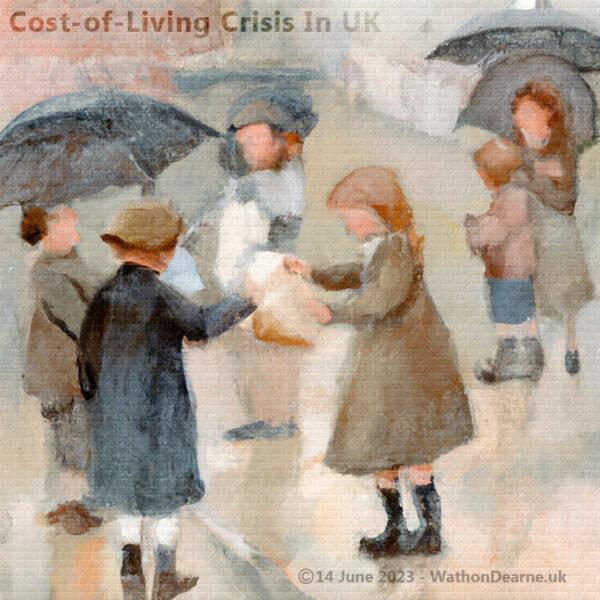Furthermore, this research has exposed the startling fact that a staggering 9.6 million Britons reside within households plagued by “serious financial difficulties.” These disconcerting findings lay bare the harsh reality confronted by many as they grapple with the unrelenting struggle to make ends meet within the unforgiving economic climate of our time.
Among those ensnared in the vice grip of financial hardship, a significant 61 percent have lamented their inability to maintain a warm and comfortable home over the past six months. In addition, nearly two-thirds of households have divulged a reduction in social interactions with friends and family (64 percent), while an equal proportion has found themselves unable to partake in hobbies and pastimes with the same frequency as before (61 percent).
The profound financial strain engendered by the exorbitant cost of living has had severe repercussions on healthcare access and affordability. A distressing 46 percent of individuals have resorted to postponing dental treatments due to prohibitive costs. Alarmingly, almost a fifth (19 percent) of those grappling with acute financial struggles have admitted to evading vital doctor’s appointments, while 18 percent have confessed to their inability to afford crucial medical equipment or medications.
Equally disconcerting is the revelation that 35 percent of all Britons acknowledge their inability to afford a balanced diet for at least one month. This alarming figure rises exponentially to a staggering 82 percent among those who find themselves most profoundly impacted by the economic squeeze on their household budgets. It is a disheartening reality that a third of Britons attribute their restless nights to financial worries, while 35 percent contend that their mental health is detrimentally affected by their financial predicament.
Moreover, 27 percent have reported that their physical well-being has suffered as a result of money concerns. People are also resorting to cutting back on takeaways and holidays, as well as patronizing cheaper supermarkets.
Respondents bemoan the perpetual need for cost-cutting measures, with a mere 26 percent affirming that they have not recently endeavored to save money. On a broader scale, the state of financial well-being has deteriorated compared to the initial survey conducted at the onset of the pandemic in April 2020. We have witnessed an 11 percentage point decline in the number of financially secure households (from 37 percent to 26 percent). This survey, commissioned by the benevolent abrdn Financial Fairness Trust for its Financial Fairness Tracker series, involved 6,540 adults and was conducted between April 24 and May 3.
The comprehensive data has been meticulously dissected and analyzed by the esteemed Personal Finance Research Centre at the University of Bristol. Mubin Haq, CEO of abrdn Financial Fairness Trust, expresses his shock, stating, “The cost-of-living crisis is exerting a profound impact on the decisions made by millions concerning their health. It is truly astounding that individuals find themselves routinely compelled to defer dental treatments, forgo necessary medications, and even endure hunger due to their inability to afford these vital necessities. The short-term savings achieved by such cost-cutting measures are likely to have long-lasting consequences on the nation’s well-being. This is an exorbitant price to pay, and it may result in reverberations within the labor market, as individuals find themselves incapacitated by ill health and unable to work.”
Professor Sharon Collard, esteemed chair in personal finance at the University of Bristol, emphasizes the deteriorating levels of food insecurity caused by the relentless rise in living costs. The increasing number of individuals unable to afford nutritious meals or even three meals a day is a cause for grave concern. While the government has taken commendable steps to support those most vulnerable, these figures demonstrate the urgent need for further assistance. Reliance on food banks cannot be seen as a sustainable long-term solution.
In light of these distressing findings, it becomes imperative for a caring government to consider viable measures that can provide immediate relief and address the underlying issues in the long term. Here are some possible suggestions that could be explored:
- Ensuring a Living Wage: Introduce policies that guarantee a living wage for all workers, which takes into account the rising cost of living and provides individuals with a decent standard of living.
- Affordable Housing Initiatives: Implement initiatives to increase the availability of affordable housing options, including social housing programs and rent controls, to alleviate the burden of housing costs on low-income households.
- Strengthening Social Safety Nets: Bolster and expand social safety net programs, such as welfare benefits and universal basic income, to provide a solid support system for individuals and families facing financial difficulties.
- Accessible Healthcare: Take steps to make healthcare more accessible and affordable, including measures to reduce the cost of essential medical treatments, medications, and equipment. Increase investment in public healthcare to ensure equitable access for all.
- Financial Education and Support: Provide comprehensive financial education programs to empower individuals with the necessary knowledge and skills to manage their finances effectively. Offer support services, such as debt counseling and financial planning assistance, to help individuals navigate financial challenges.
- Tackling Food Insecurity: Implement strategies to combat food insecurity, such as expanding subsidized food programs, supporting community food initiatives, and collaborating with local organizations to establish food co-operatives and affordable grocery stores in underserved areas.
- Long-Term Economic Policies: Adopt policies that address income inequality, promote fair wages, and prioritize investment in job creation, particularly in sectors that offer stable and well-paying employment opportunities.
It is vital for a caring government to recognize the severity of the situation and take proactive steps to alleviate the hardships faced by millions. By implementing a comprehensive approach that combines immediate relief measures with long-term solutions, we can work towards creating a fairer society where no one has to endure the harsh consequences of financial hardship.
14th June 2023
wathondearne.uk
